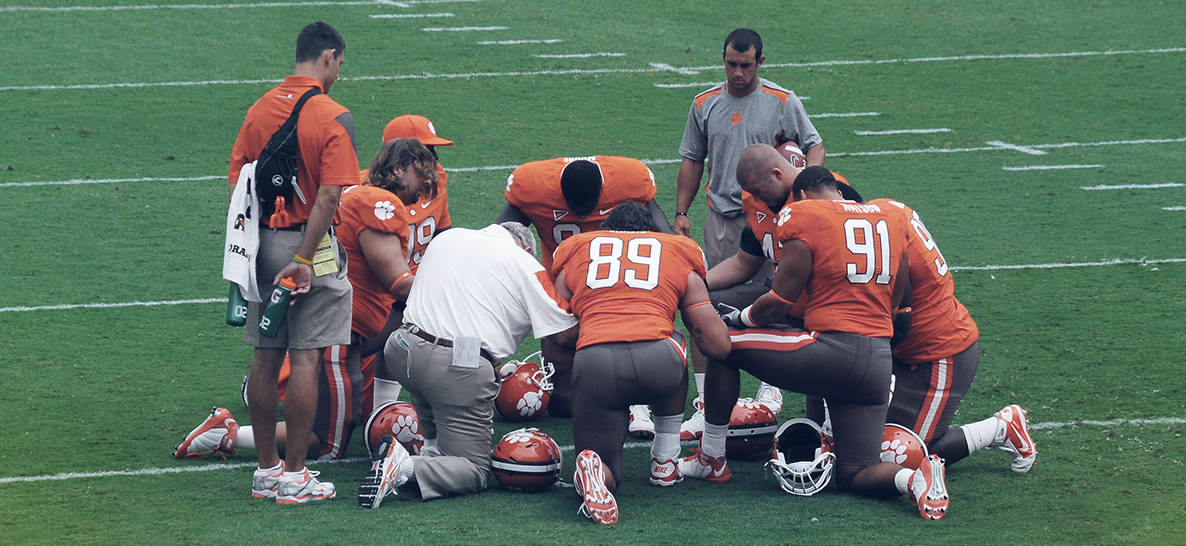
Few would argue that prayer isn’t of vital importance for the people of God. But some prayers don’t seem important at all.
I’m talking about prayers for trivial things like a good parking spot, for the lights to be green when we are running late, or for our football team to win the big game.
These types of prayers cause us to ask, “Should we pray for everything—even the small day-to-day kinds of things?” Which is to ask, “Does God care if my team wins?”
“Does God Care?”
Imagine you went to your local high school’s football game on a Friday night. The atmosphere is electric and there is a stir in the crowd because everyone knows that tonight—this very game—is the one that will determine whether they make the playoffs. So you pray they will win. You rationalize that your prayer is not about the game as much as it is about the students, the school and the good it will do in the community. Then, your team rallies late in the fourth quarter and pulls off the biggest upset in the history of high school football.
We may want to say, “God does care!”
Before we get too carried away; allow me to tell you about a family in my church. They are young parents whose daughter was diagnosed with brain cancer before her first birthday. They constantly prayed for her healing, and sat with our church’s leadership several times to pray over their daughter. And we were not the only ones who prayed. Hundreds of people in our church prayed faithfully for years for the healing of this little girl. But, after a three-year battle with cancer, she passed away.
We may want to say, “Does God care?”
Because if God can respond to a prayer about high school football team and at the same time go silent to prayers for the healing of a little girl, what kind of God is He? Can we count on Him for the big things or just the little things? Can we count on Him at all? Can He be trusted?
I wish there was a clear-cut, easy answer with regard to why God responds favorably to one situation and not to another. But, truth be told, there isn’t. However, this does not mean we have to give up on praying altogether. Just the opposite, we ought to dig in deeper than ever.
Expecting Comfort
We must wrestle with these questions, and consider a few things. First, we should look at ourselves. Second, we should ask what prayer can do. Third, ask what does God want. Then we can return to whether or not God cares. So let’s begin by looking at ourselves.
It’s not unpopular to believe God wants us to be comfortable and happy. So we pray for everything we want—trivial or not—as though God is our divine concierge whose job is to make our earthly stay more comfortable. Few of us want to admit we think like this, but it would do us well to admit we are largely an entitled bunch.
We live each day expecting good, not harm, to come our way. And when harm does come, we are stunned and confused. For as much as we struggle when bad things happen we are nowhere near confused when good things happen to us. Why?
Because we expect good things in our lives.
The expectation of good things is a message peddled and preached from pulpits across America and held onto as God’s shining truth by millions. It should be no surprise, then, to find our prayers and requests are often in the direction of benefitting us. But this is misguided.
Does God care about us? Yes. But this should not be confused with God ensuring our pleasure and giving us what we want. As long as our comfort and wants are the focus of our prayers, we will remain the dangerous place of falling asleep in the comfort of our privilege. Prayer has the power to change us, rather than only ensure our happiness.
Which brings us to what prayer can do.
Moving Toward Selflessness
Prayer ought to move us away from a selfish way of living toward a selfless way of living. If we are honest, praying for trivial things—a good parking spot, green lights, our team to win—is quite self-centered. Prayer ought to turn us outward.
Several years ago, a friend of mine challenged me to spend time every day for a month thanking God for all that was in my life. I responded by saying, “Sure, I’ll do that.” In my head I thought this is the cheesiest thing ever. Then I did it. For 30 days, I thanked God for all I have been given, and something unexpected happened.
My prayers became less about me.
By simply saying “thank you,” I found myself wanting and needing less. My prayers for myself were less trivial and more focused on deeper longings and desires. As I thanked God for my wife, children and closest friends, I spent more time in prayer for them than ever. When I thanked God for my church family, my requests were about what God wanted to do in and through us.
By shifting the center of prayer away from myself, I was able to pray, think and live in a far more selfless way than ever. What I am learning is prayer is about tuning our heart, mind, body and soul to God’s melody. This is something I am still growing in—and will forever be.
Which brings us to what God wants.
Talking about what God wants is another way of asking, “What is God’s will?” When it comes to prayer, asking what God wants may seem counterintuitive, because we believe prayer is about getting what we want. Thankfully, there is an easy way to learn what God wants.
The Bible is dripping with the heart and longing of God for our world. He wants the reconciliation, restoration, redemption and renewal of all things. Not only does He want this, he invites us to work alongside Him toward that end. Which means everything we say, all we do and all we pray either contributes toward reconciliation or works against it.
This is why we ought to align our prayers with God’s will, but this should come with a warning. Let’s not forget, Jesus aligned His prayer with His father’s will. The night before He was crucified, He prayed in the garden, “Father, not what I want but what you want.” The result? He was crucified. Because sometimes doing what God wants will result in our suffering, at least right now.
And now, back to whether God cares about the small things like praying for your team to win. I fully we believe we can say, “God does care!” But maybe when it comes to trivial prayers we ought to ask, “Does God care?”























